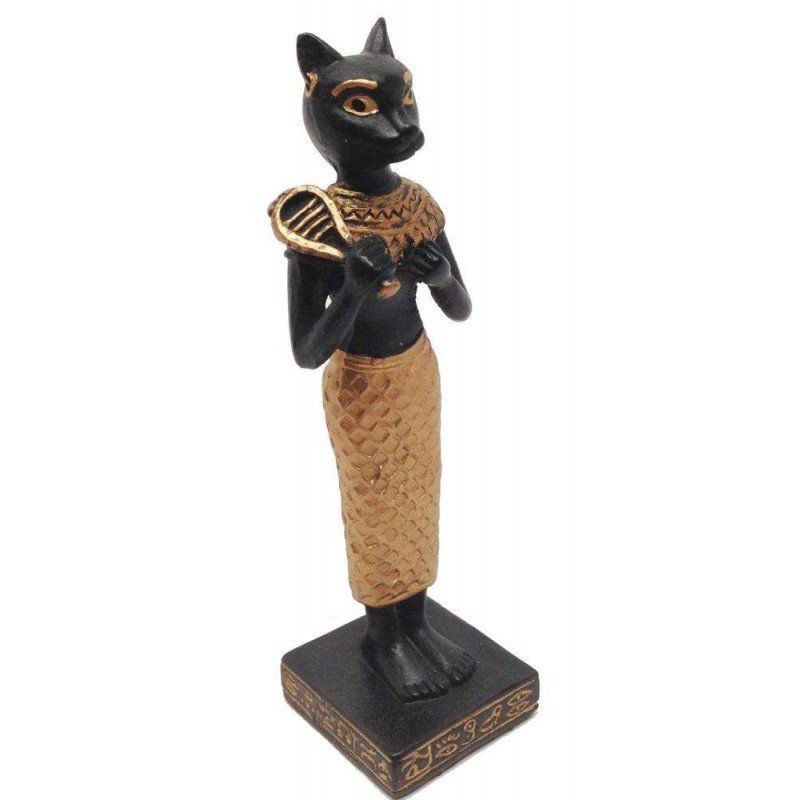Kimungu Madhabahuni - Bastet (Deity of Afrikan Holistic Health)
- By kwende ukaidi
- •
- 29 Mar, 2020
- •
Celebrating Kimungu Madhabahuni

Before the great Imhotep came to be, the Creator Supreme ensured the wellbeing of Afrikan souls with the divine presence of supreme ones such as Djehuti, Sekhmet or Bastet. All of whom were grand caretakers of the Afrikan holistic health. Indeed, Imhotep emerged as an ascendant of these superlative divinities. Himself being empowered to maximally develop and enliven Afrikan souls by the pantheon of deities that he inevitably became a part of. For Afrikan spiritual and cultural fabric of life is steeped in harmonious complementarity to service and promote optimal Afrikan living. This is all in the living of holistic Afrikan healthiness.
Originally, represented in queen-form with the head of lioness and later with the head of other feline types Bastet is a powerful Afrikan deity of protection and wellbeing for the soul people of nationhood. She fiercely guards against plagues and other disastrous ills that have the potential to bring harm. Afrikan souls honoured this great protector in order to best protect their living shrine of self, from personhood to nation.
Throughout the ages, it is evident that if Afrikan souls ever turn away from the divine integrity of their own way of life and their true essence of living that manifests the best self-determined wellbeing possible, vulnerability to alien ills increase.
During the horrific Maafa of recent centuries Afrikan wellbeing has been under constant threat of destruction by the foreign forces of anti-Afrikan agency. The vile plague of enslavement, colonisation and other genocidal ills have torn Afrikan souls from their own self-determining way of healthiness and has left the scourge of open vulnerability for the criminal alien pirate to have his wicked way. Yet despite the enemy onslaught Afrikan souls found ways to remember and express their knowingness of the spirit of feline protection in the face of criminal intent:
‘Kisander was a cat.
Anansi and Mouse were afraid of Kisander. She could see in the dark. She could walk so swiftly and so softly that no one knew when she was coming. Anansi and Mouse (whose full name was Mouse Atoo and whose pet name was Moos-Moos Atoo) feared Kisander’s sharp teeth and cruel claws and her eyes that shone in the dark.
But Kisander had a dokanoo tree, and the tree had lovely puddings on it. No one else had such a tree. Anansi and Moos-Moos both loved the puddings, and whenever they went past Kisander’s garden they wondered how they could get some of the puddings from Kisander’s tree.
Kisander was very proud of the tree. In the mornings she would go out and take a hoe and dig around the roots of the tree until she had made a little gutter. Then she filled the gutter with water, and this made the puddings grow large and sweet’.
In popularised modern cinema, Afrikans lodged in the film industry have made best efforts to highlight Bastet through dramatised depiction in a dignified way, even under the dire constraints and manipulations of a foreign controlled medium. Referred to in the shortened form of Bast, the supreme deity of the fictional nation of Wakanda is Bastet reimagined for fictional representation.
Afrikan people must surely continue to take the best care of themselves possible. Alien attack upon Afrikan well-being has been a consistent generational threat in recent centuries. As such, the shrine of the Afrikan self must be safeguarded at all levels.
The mighty prowess of Bastet can continue to empower Afrikan life and wellbeing energising Afrikan souls throughout the world to bring out the best self-determined efforts for themselves possible. For righteous order and wellbeing for the world is at stake.
The forthcoming spiritual and cultural observance of Kimungu Madhabahuni is a time of year to celebrate the Afrikan shrine at home and beyond. Kimungu Madhabahuni takes place during the holiday period associated with the spring equinox. At this time many people are away from the mundane of the various institutions albeit largely as a dictate of presently popular foreign religious doctrine. This therefore, can allow many more Afrikan people the time and space to restore, elevate and be themselves freely in reverence at their own special places.Throughout the annual cycle of the spiritual and cultural calendar of the Universal Royal Afrikan Nation observance to observance, Afrikan life is endowed with the essential of living knowingness. For the Afrikan souls, being a part of an organ for mission ascendancy is key. The Universal Royal Afrikan Nation is a spiritually and culturally rooted organ for Afrikan ascension.
The Universal Royal Afrikan Nation (URAN) is an Afrikan-centred spiritual and cultural mission for ascendancy that embodies living spiritually and culturally rooted life. To find out more about URAN and its spiritual-cultural mission for liberty and nationhood click here. The exquisite URAN pendant can be obtained online by clicking here.
In his capacity as an Afrikan-centred spiritual cultural practitioner this author is available for further learning in this regard and also for the carrying out of ceremonies such as naming and name reclamation. For details please click here.
Afrikan World Studies programmes are an important forms of study in understanding the Afrikan experience. There are a range of subjects covered on these programmes including History, Creative Production, Psychology and Religion. To find out more about these learning programmes please click here. For the video promo for these learning programmes click here.
At nominal cost, also consider acquisition of an a4 laminate poster of articulations by this author when visiting the Yemanja institution to enrol, consult, learn, gather or otherwise.
Also, visit www.u-ran.org for links to Afrikan liberation Love radio programme on Universal Royal Afrikan Radio online.
